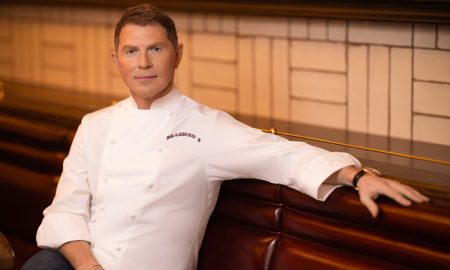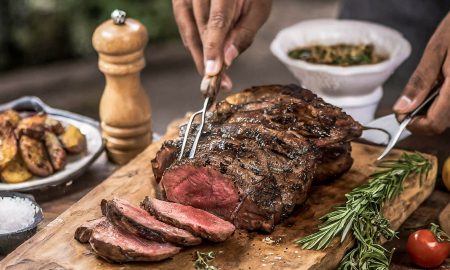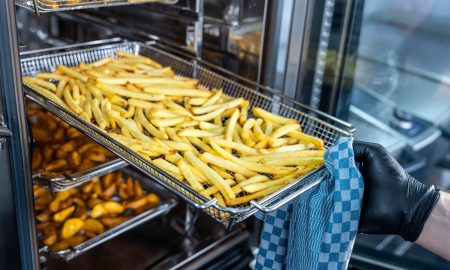“We went to Salt & Silver in Hamburg some time ago. Super-creative food, really interesting flavor combinations, awesome wine, great service. And at one point Jo, the chef, came out to our table and told us about how they pick their wines…” Anecdotes like that make it twice as fun to tell your friends about a new favorite restaurant. What do you think was the highlight of the evening? Chef Johannes Riffelmacher: young, chill, and a self-promotion champion.
One little conversation like that turns dinner into a lifestyle experience. The kind of thing you tell other people about. Which is like free marketing for the restaurant. The key is having a communicative team and a chef who considers approaching customers part of the job.

Thomas Kosikowski and Johannes Riffelmacher / Image: Salt & Silver
Good times allowed
Times have really changed in that regard. Back in the 80s, Paul Bocuse – “the Chef of the Century” – became the first Michelin-starred chef to do his own cooking shows, paving the way for the idea of a chef being the focus of a media spectacle. These days, one look through any issue of KTCHNrebel will tell you that there are culinary celebrities all over the world. They’re role models to their fans, who want to see more of them – and not just on TV or YouTube, but live in their restaurants.
Thanks to all this media attention, chefs enjoy a lot more prestige than they once did. The flip side, of course, is that cooks are expected to quit hiding by the stove and come out to meet their diners. As a chef, the kitchen isn’t your only stage anymore – your adoring public is out there in the dining area, just waiting to be swept off their feet. Whether you’re serving haute cuisine or flipping burgers at the corner diner,
your customers are looking for a feel-good atmosphere where they can laugh and have a good time… and if they can do it along with the chef, so much the better. Going out to eat isn’t a “serious” activity anymore; these days, it’s about having a great ambiance and likable staff. Meeting the head chef personally is part of the restaurant experience now. It’s something customers are only too happy to shell out for.
Tradition vs. Modernity
Even renowned old-school chefs are done hiding behind their menu creations. Take the now 70-year-old cooking legend Dieter Müller, whose website tells customers that “…if you’d like to get to know us personally and join us in the kitchen, we’d love to welcome you to our cooking school.”
The appeal of cooking school
Restaurant-run cooking classes really are a fantastic marketing tool. Customers get everything they’ve ever wanted out of a culinary experience: entertainment, personal interaction, great food – and maybe a couple of tips and tricks they can use at home, although those are actually less important to most cooking class participants.
Many restaurateurs underestimate how much of a draw those classes can be, which means they’re missing out on huge opportunities. Everyone knows how important marketing is in the ultra-competitive restaurant industry. Everyone knows that advertising can be seriously expensive, whether it’s on social media or through the local paper. So why aren’t more people jumping at this chance for low-cost self-marketing?
Obviously, not everyone’s as naturally charming as Jamie Oliver, Nils Henkel, Cornelia Poletto or Tanja Grandits, but the four of them are still great examples of how personal branding can help chefs establish an authentic, believable brand profile.
Self-promotion is learned… or delegated
Culinary school doesn’t teach chefs about marketing – neither in Germany nor in more selling-oriented cultures like the US and Japan. In truth, though, learning to interact with customers is every bit as important for young chefs as it is for service staff. Fortunately, it’s easier than ever to connect with customers these days.
If, for whatever reason, you can’t stand the thought of making regular rounds through the dining area, you always have the option of hiring someone to do it for you – for example, delegating the networking to a restaurant manager, floor manager, or your best server, with the understanding that you’ll make an appearance if the customer has concrete follow-up questions.
Tips and tricks for self-marketing
- The ground rules: think of yourself as a brand and use self-promotion as a cost-effective marketing solution. In the restaurant world, it’s easier than you might think.
- So come out from behind your pots and pans and visit customers’ tables, or open the kitchen door and chat across the counter. Conversation topics will come up almost automatically.
- Be visible on social media. Update your Facebook, Twitter, Instagram, etc. accounts regularly and offer insight into life behind the scenes. You can interact with your fans directly, start discussions, ask questions, crack jokes… whatever feels right to you. Revealing your personality through social media is a good alternative for shyer chefs.
- Be prepared to blog. If you need more space for your content, you can let loose on your own personal blog. Good storytelling is the essence of a strong brand, and it helps you stand out from the masses. Personal anecdotes, new developments, and background information always make for a good read, and help you form emotional connections to your customers.
















